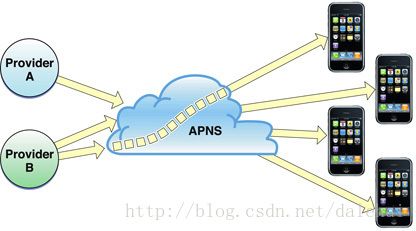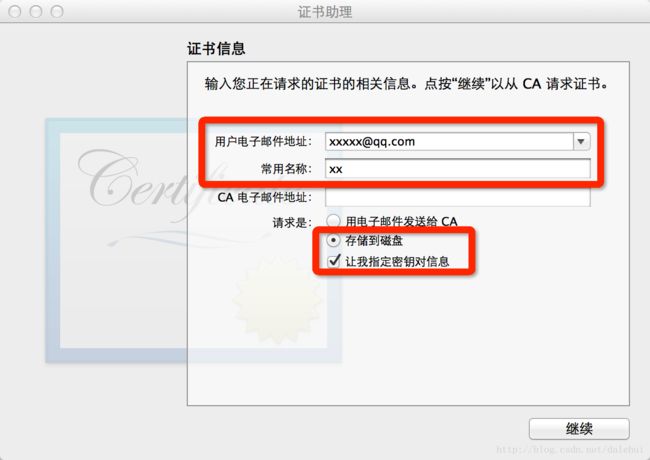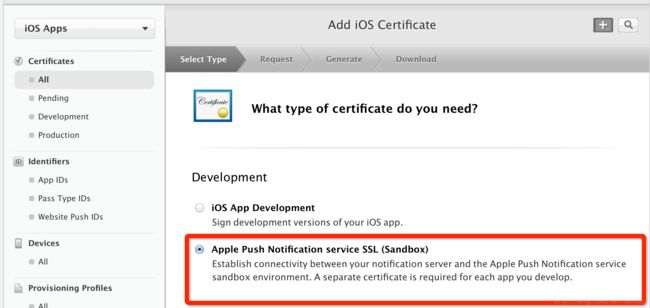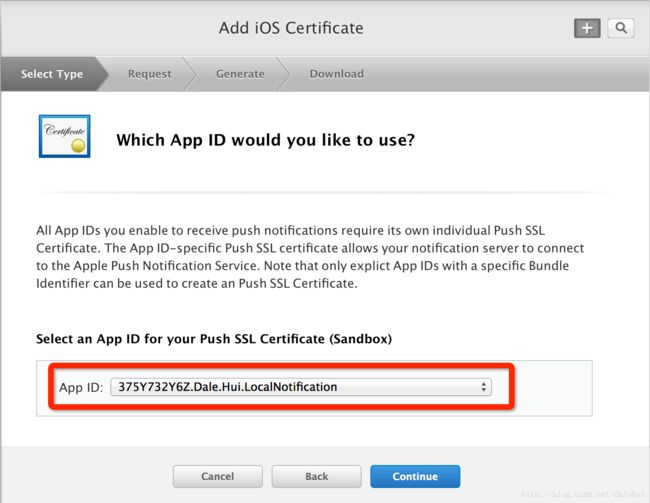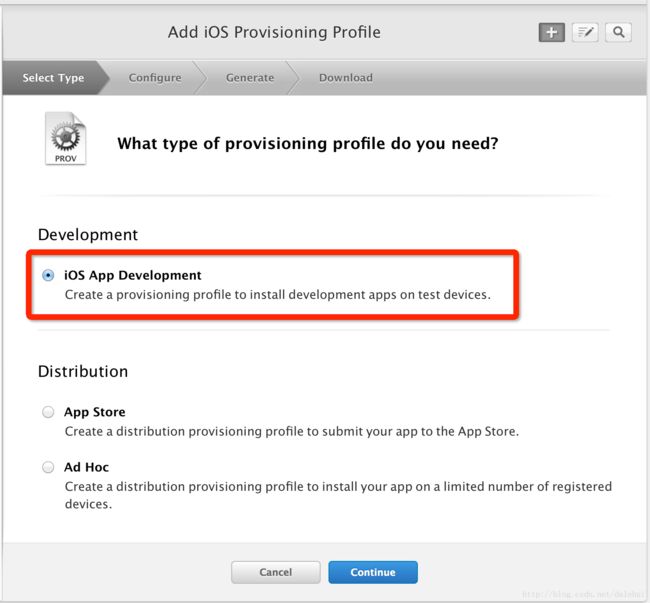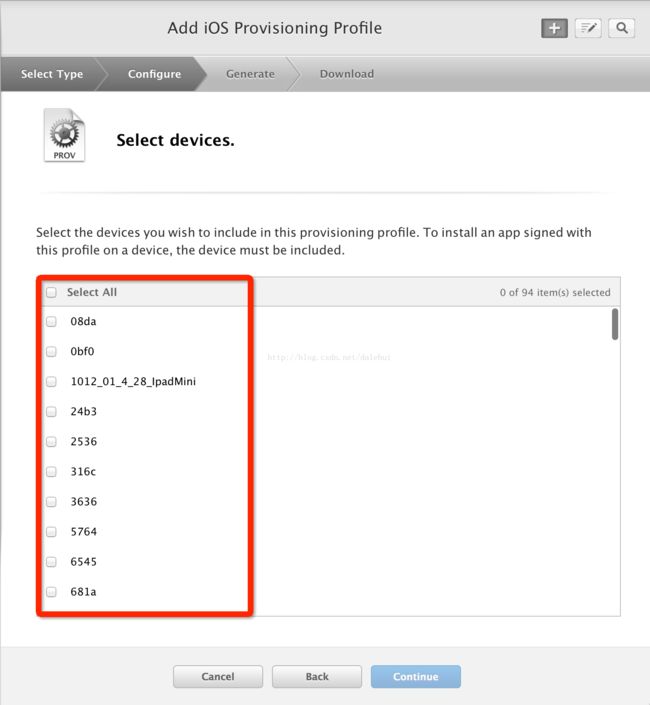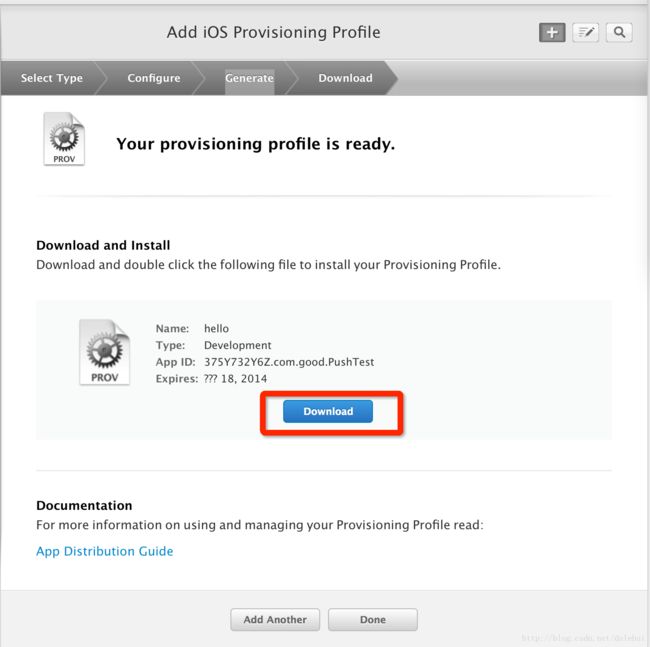IOS本地,APNS远程推送(具体过程)
本文主要是教你做推送的
本地推送
添加本地推送
///本地添加
-(void)addLocalPushNotification:(UIButton*)sender;
{
NSLog(@"%s",__FUNCTION__);
UILocalNotification* localNotification=[[UILocalNotification alloc]init];
if (localNotification) {
//设置时间当前加20秒
NSDate* pushDate=[NSDate dateWithTimeIntervalSinceNow:20];
/*推送时区设置:从网上搜到
timeZone是UILocalNotification激发时间是否根据时区改变而改变,如果设置为nil的话,那么UILocalNotification将在一段时候后被激发,而不是某一个确切时间被激发。*/
localNotification.timeZone=[NSTimeZone defaultTimeZone];
///推送时间设置
localNotification.fireDate=pushDate;
//时间间隔,若不设置将只会推送1次
localNotification.repeatInterval=kCFCalendarUnitDay;
//推送时的声音,(若不设置的话系统推送时会无声音)
localNotification.soundName=UILocalNotificationDefaultSoundName;
//推送的文字信息(若不设置,推送中心中不显示文字,有声音提示前提是设置有声音)
localNotification.alertBody=@"Hello world";
//推送时小图标的设置,PS:这个东西不知道还有啥用
localNotification.alertLaunchImage=[[NSBundle mainBundle]pathForResource:@"3" ofType:@"jpg"];
///这个东西,到时用于定位是哪个notification,以便取消用
NSDictionary* infoDic=[NSDictionary dictionaryWithObject:@"name" forKey:@"key"];
localNotification.userInfo=infoDic;
//讲推送设置以及信息加入
UIApplication* app=[UIApplication sharedApplication];
BOOL status=YES;
for (UILocalNotification* notification in app.scheduledLocalNotifications) {
if ([notification.userInfo objectForKey:@"key"]) {
status=NO;
}
}
if (status) {
//加入推送(只能加入一次)
[app scheduleLocalNotification:localNotification];
}
NSLog(@"%@",app.scheduledLocalNotifications);
}
}
///本地移除
-(void)removeLocalPushNotification:(UIButton*)sender
{
NSLog(@"%s",__FUNCTION__);
UIApplication* app=[UIApplication sharedApplication];
//获取当前应用所有的通知
NSArray* localNotifications=[app scheduledLocalNotifications];
if (localNotifications) {
for (UILocalNotification* notification in localNotifications) {
NSDictionary* dic=notification.userInfo;
if (dic) {
NSString* key=[dic objectForKey:@"key"];
if ([key isEqualToString:@"name"]) {
//取消推送 (指定一个取消)
[app cancelLocalNotification:notification];
break;
}
}
}
}
//取消当前应用所有的推送
//[app cancelAllLocalNotifications];
}
远程推送
当服务端远程向APNS推送至一台离线的设备时,苹果服务器Qos组件会自动保留一份最新的通知,等设备上线后,Qos将把推送发送到目标设备上
客户端需要注意的
bundle ID与App Id一致
设备Token能正常获取
若为沙盒测试,证书得使用developer的
单设备
如上图所示:我们的服务端将需要推送的相关信息提交到APNS(Apple Push Notification Service),由APNS在Push服务IOS设备列表中找到对应的设备,并将信息推到终端上,终端上再推到客户端APP上
多设备
流程大概是这样的
1.生成CertificateSigningRequest.certSigningRequest文件
2.将CertificateSigningRequest.certSigningRequest上传进developer,导出.cer文件
3.利用CSR导出P12文件
4.需要准备下设备token值(无空格)
5.使用OpenSSL合成服务器所使用的推送证书
1.打开钥匙串,在右上角选择(钥匙串访问->证书助理->从证书颁发机构请求证书)
生成 CertificateSigningRequest.certSigningRequest
以下信息填写号后,保存到对应位置
2.进入developer.apple.com中 上传CertificateSigningRequest.certSigningRequest并保存cer文件
(1)
(2)选择类型为 推送服务--沙盒测试用
(3)选中对应的APP ID,别忘了,项目配置文件中的Bundle ID与其一致
(4)选择保存路径
(5)选择上传文件 CertificateSigningRequest.certSigningRequest
(6)保存cer文件,并双击添加进钥匙串
(7)新建一个Provisioning Profiles
选中与前面一致的 App Id
选中刚才新建的certificates
选择可调试设备
保存provisioning文件,并将其加入设备中
通过OPENSSL文件合并
1.在钥匙串->证书 找到刚才所添加进去的证书 右键导出p12
2.进入终端 ,将aps_development.cer转成PushChatCert.pem(openssl x509 -in aps_development.cer -inform der -out PushChatCert.pem)
3.openssl pkcs12 -nocerts -out PushChatKey.pem -in Push.p12 生成p12私钥 .pem文件(需设置密码,服务端推送时要用)
4.利用PushChatCert.pem和新生成的PushChatKey.pem合成一个新的p12文件(这个p12是提供给服务器推送用的)(
openssl pkcs12 -export -in PushChatCert.pem -inkey PushChatKey.pem -certfile CertificateSigningRequest.certSigningRequest -name "aps_developer_identity" -out aps_developer_identity.p12
)
合成PHP所用的PEM文件
- openssl x509 -in aps_development.cer -inform der -out PushChatCert.pem
- openssl pkcs12 -nocerts -out PushChatKey.pem -in Push.p12
- cat PushChatCert.pem PushChatKey.pem > newck.pem
代码实现如下
注册推送通知
[[UIApplication sharedApplication] registerForRemoteNotificationTypes:
(UIRemoteNotificationTypeAlert|
UIRemoteNotificationTypeBadge|
UIRemoteNotificationTypeSound)];
在AppDelegate中加入以下几个代理方法
///Token值成功获取的时候走的是这个方法(Token值不能带空格)
-(void)application:(UIApplication *)application didRegisterForRemoteNotificationsWithDeviceToken:(NSData *)deviceToken
{
NSLog(@"%@",deviceToken);
}
///Token值获取失败的时候走的是这个方法
-(void)application:(UIApplication *)application didFailToRegisterForRemoteNotificationsWithError:(NSError *)error
{
NSLog(@"%@",error);
}
///应用程序处在打开状态,且服务器有推送消息过来时,以及通过推送打开应用程序,走的是这个方法
-(void)application:(UIApplication *)application didReceiveRemoteNotification:(NSDictionary *)userInfo
{
for (id key in userInfo) {
NSLog(@"%@:%@",key, [userInfo objectForKey:key]);
}
///Icon推送数量设为0
// application.applicationIconBadgeNumber=0;
}
应用程序不处在后台,且通过推送通知打开的时候,如果需要推送下来相关的信息可以在
- (BOOL)application:(UIApplication *)application didFinishLaunchingWithOptions:(NSDictionary *)launchOptions
方法中加入
///应用程序不处在后台,并且是通过推送打开应用的时候
if (launchOptions) {
///获取到推送相关的信息
NSDictionary *userInfo = [launchOptions objectForKey:UIApplicationLaunchOptionsRemoteNotificationKey];
}
服务端PHP推送代码
array("alert" => 'helloHui',"badge" => 2,"sound"=>'default')); //推送方式,包含内容和声音
$ctx = stream_context_create();
//如果在Windows的服务器上,寻找pem路径会有问题,路径修改成这样的方法:
//$pem = dirname(__FILE__) . '/' . 'apns-dev.pem';
//linux 的服务器直接写pem的路径即可
stream_context_set_option($ctx,"ssl","local_cert","26ck.pem");
$pass = "123123";
stream_context_set_option($ctx, 'ssl', 'passphrase', $pass);
//此处有两个服务器需要选择,如果是开发测试用,选择第二名sandbox的服务器并使用Dev的pem证书,如果是正是发布,使用Product的pem并选用正式的服务器
// $fp = stream_socket_client("ssl://gateway.push.apple.com:2195", $err, $errstr, 60, STREAM_CLIENT_CONNECT, $ctx);
$fp = stream_socket_client("ssl://gateway.sandbox.push.apple.com:2195", $err, $errstr, 60, STREAM_CLIENT_CONNECT, $ctx);
if (!$fp) {
echo "Failed to connect $err $errstrn";
return;
}
print "Connection OK\n";
$payload = json_encode($body);
$msg = chr(0) . pack("n",32) . pack("H*", str_replace(' ', '', $deviceToken)) . pack("n",strlen($payload)) . $payload;
echo "sending message :" . $payload ."\n";
fwrite($fp, $msg);
fclose($fp);?>
